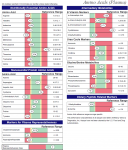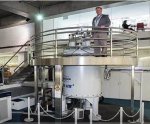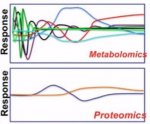Thank you so much already
@ChrisArmstrong for answering so many questions here (and on other threads), following on from your brave webinar appearance during the zombie hour of the morning, with a cold (man, you sounded so relieved to reach the end of that, lol


).
I'll quickly mention that
@Cort covered your work the other day,
here on his Health Rising blog (although I'd guess you know that already).
I'd also like to say how much your paper's findings struck a chord with me personally. I mean, I know it's be laboured (above) that:
This is an important point that needs to be understood, individual metabolite profiles aren't going to match what these metabolite studies are showing.
...But aspects of the metabolic picture you found happened to tally well with my own serum amino acids results from 3 years hence (shown in expandable picture, below). Low essential AA across the board with that tell tale very high aspartic acid (from the use of AAs via glutamine as a fuel). A feature I'd not had any explanation for at all before. (Issues with sulphur pathway too, that you may of mentioned in passing.)

It's kind of funny how we patients have been able to get these test for years, but are still extracting possible meaning from them years after the results. And research seemingly only just able to look at things like this in a meaningful way. Kind of backwards, perhaps, from naive expectations of medicinal science.
I'm aware of how these should be taken with a spoon full of salt, in terms of their meaning (enigmatic as they tend to be already) and the isolated nutritional recommendations the commercial ones carry, too. Especially as they will presumably be calibrated on healthy individuals.
Now for some fairly big, open ended questions...:
(1) What trends do you see in the use and effectiveness of the different metabolomic testing technologies (which might we expect to see or have used on us in future)?
My Genova test, for example, will have been done using
High-performance liquid chromatography (HPLC), I believe. Which I think essentially separates different sized molecules mechanically, as they move through an adsorbent material at different rates (if I understand correctly). Presumably this produces a kind of bar-code like diffusion pattern that can be read-off, as with those old style genetic tests... Anyway, how does this (older?) technology compare in accuracy and cost to optical and NMR spectroscopy?
You say that NMR is currently much cheaper than MS (mass spectroscopy), but is it likely to scale down in cost much? The setup involves a massive superconducting magnetic chamber, right? Is it the case that whiles that's pretty expensive in itself, the sample measurements are quick and clean (and you just share time on one)? (Sorry, I'm so vague on this, ironic since I did a physics degree, some years ago, at the University of Nottingham, with a tutor based in the
Peter Mansfield NMR centre, heh.

)
 < From your webinar video (NMR test equipment used?).
< From your webinar video (NMR test equipment used?).
I get the impression that optical spectroscopy technologies are really improving rapidly in price-performance and miniaturisation. (Exponential technological advances are a particular interest of mine.) So even if it is more expensive than NMR right now, is it likely to be cheaper (and better in many ways), within the next decade, say? (With NMR reliant on less shrinkable equipment?)
(2) Is there some resource that gives some kind of easily digestible, qualitative (and quantitative) indication of how much and how rapidly each type of metabolite tends to vary (and under what conditions)?

Its cool that you highlighted this, since when we look at our own results there's no indication or
feel for what what the dynamics are like there. The kind of talk I see about people's out of range results tend to be very linear in it's induction. There's often no appreciation for the relative magnitude of the quantities, even, with just a plain number quoted.

Let alone thinking about whether different metabolites will take days or months to slide out of range, or how much they might spike at various times after eating (as you mention).
For example, my nutritionist, at the time, suggested that low serum AA levels across the board like that (it was a fasted morning draw, I think) would likely be the product of months of decline. Is that reasonable? How big might a protein meal AA peak be, by comparison? Fat soluble vitamins (D, K, A, E) are certainly very slow to change, right? On the opposite end of the scale, I was looking up adenosine, and that's stated to have a serum half-life of under 30 seconds!(?) It puzzled me how substances like that are even measured... (Is it all produced locally to the site of the blood draw? Do it's levels reduce in the sample, after draw, to an equilibrium set by enzymes in the blood? Etc.) Where-as, for one thing, people are generally familiar with blood glucose level variations, up and down within a day (from diabetics in trouble on medical dramas).
What I'd really like to see are demonstrative dynamic models of metabolite levels. Preferably interactive ones that you can poke with an input change, to get a feel the pliability/elasticity characteristics and knock effects through the various paths to other metabolites... Although, even a written data repository would be a step up from hit-and-miss Wikipedia pharmacokinetic numbers. Even the
human metabolome database often doesn't seem to have the relevant info.
(3) Have you used computational simulation of human metabolism at all, or know much about others who have?
Some years ago I saw a there were various efforts aiming at ultimately creating a totally detailed whole body virtual modelling system of the interplay of metabolites, proteins, genes, etc, across the various compartments and tissue types of the body. Are such things visibly happening or having any impact yet, in your experience?
I envisage this kind of super-detailed simulation being used as in conjunction with data fed in from the various types of testing (and a Watson-like integrated AI expert system), as the new paradigm of medicine (2.0). One that's more preventative and holistic. But before then, I'm wondering if similar approches might get some early action being used for treating us lot, here. I mean, like you've been saying...
Yeah I don't expect there to be a button but it all depends what is occurring in the individual. We will be engaging in genetic profiling during the long-term monitoring to determine if individuals have a genetic issue that is hindering their recovery.
I'm assuming it will take long-term monitoring to bring the metabolism up together.
...It seems unlikely at this point that proper recovery from CFS/ME will be as straight forwards as a drug monotherapy (for most). Might it even be the case that targeting the most derange quantities in a patient, to bring them all up together, may not be effective? (Or a lot less effective than optimum.)
I mean, you talked about (metaphorically) picking up all (or enough) of the fence posts at once, to get it (metabolism) to stand back up. I'd previously thought about things more like an umbrella, blown inside out: the body has seemingly transitioned to a distinct, stable state. But similarly you need to apply force against many of the spokes simultaneously to revert it.
Could it be that, for some, it's going to take a fairly clever, dynamic, tailored set of interventions. Somewhat like an orbital insertion manoeuvre in space, where you can't just aim straight at where you want to go - it's a whole lot more slide-ways and unintuitive than that.
I mean, metabolism is a great big interwoven web of feedback loops, right? Such that I imagine the CFS/ME state as perhaps being an unusual orbit, around some 'strange attractor', if you are looking at what's going on in some abstract multi-dimensional phase space plot of important metrics. That when we are simple looking across things in one dimension, most of the quantities either fall into the normal area, or behave totally incomprehensibly, because we're not aware of the overall dimensions of what's happening.
 <A strange attractor ploted - chaotic behavior can seem random, but will stay within certain bounds.
<A strange attractor ploted - chaotic behavior can seem random, but will stay within certain bounds.
Or even that (stretching my space comparison) there may exist clever lit
tle adjustments
to be made that are far cheaper, easier, less problematic, requiring perhaps only over-the-counter nutrients, that will almost miraculously fix things. If one can just figure out some weird way to apply them to the specific individual. In the solar system, it's been found that there is a dynamically changing network of routes between gravitational Lagrange points and such, requiring almost zero thrust to traverse between the orbits of any planet (but a lot of time and finesse).
(4) In your opinion, could it be possible that the X-factor in patient's blood, which Fluge-Mella/Davison say causes healthy cells to konk-out, might not (always) be a distinct factor? (Like an auto-antibody.) Could it be a profile of the metabolites and factors themselves? That the cell (or mitochondria) is integrating across all these signals it's sensing, not requiring any single one to always be present. (Sorry, rampant half-arsed speculation. I'm sure we'll find out something concrete from them fairly soon.)
@Freddd, in his B-12 protocol [
1,
2,many other places (I get lost, sorry)], has talked about a 'deadlock quartet', with regards to his supplement treatment protocol, and many complexities with getting the various central wheels of metabolism (particularly methylation) turning properly again. Writing about paradoxically induced
'doughnut hole' folate deficiency, for example, as a very counter-intuitive, emergent problem, that appeals to my conception of chaotic orbits. I see now that he's previously mentioned such things explicitly with regard to 'refeeding syndrome' (e.g. exhausting potassium, also troubles with interrupting the body's nutrient triage system with too small doses of folate, I think).
Also Amy Yasko's work, Rich Van Konynenburg's offshoot of that, etc, I guess they've helped capture my imagination down this route. Although, playing around with B vitamins and such has failed me a number of times. Maybe this is some direct problem, like gut bacteria getting in the way, or it just not being appropriate for my biology. Frustrating, that there's so much promise there, if I could just see what was going on; trying to implement such complex protocols while unable to measure one's internal state can feel like trying to solve a Rubik cube blindfolded, having never seen one before. No feedback aside from slow dawning realisation that things have been getting gradually worst for weeks. (Since even the limited testing that is on offer is too expensive and hard to access, here anyway.) Hence why talk of longitudinal testing/treatment sounds amazing.
However, well organised longitudinal metabolite profiles I think will be very useful for the individual. We are running a project on this and I think Ron Davis is too.
Or do you think all this complexity that these clever people (mentioned above) have been exploring is likely to turn out to be somewhat of a Gordian knot? One that's about to be cut by discovery of some previously unseen or unconsidered factor... (Sorry, that's a bit of an impossible question.)
Sorry for all the prattle there...

I'd appreciate any of your thoughts on any aspect of the above. Having been accumulating thoughts on this for a couple of weeks (of not being able to get myself together enough to post) I've got rather too much in mind. So might make a second (big) follow up post with the rest too, including some more personal perspectives. That's if no one throws me off the forum for trying to waste the valuable resource of your time...


Oops.




